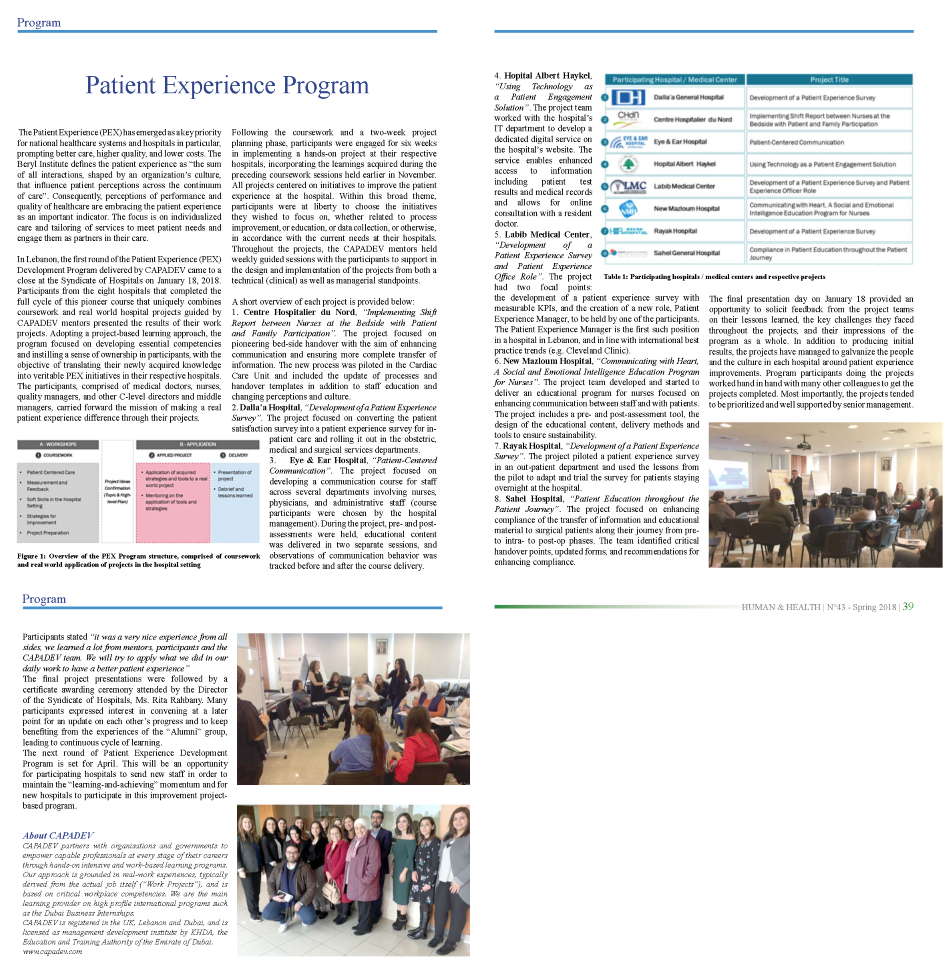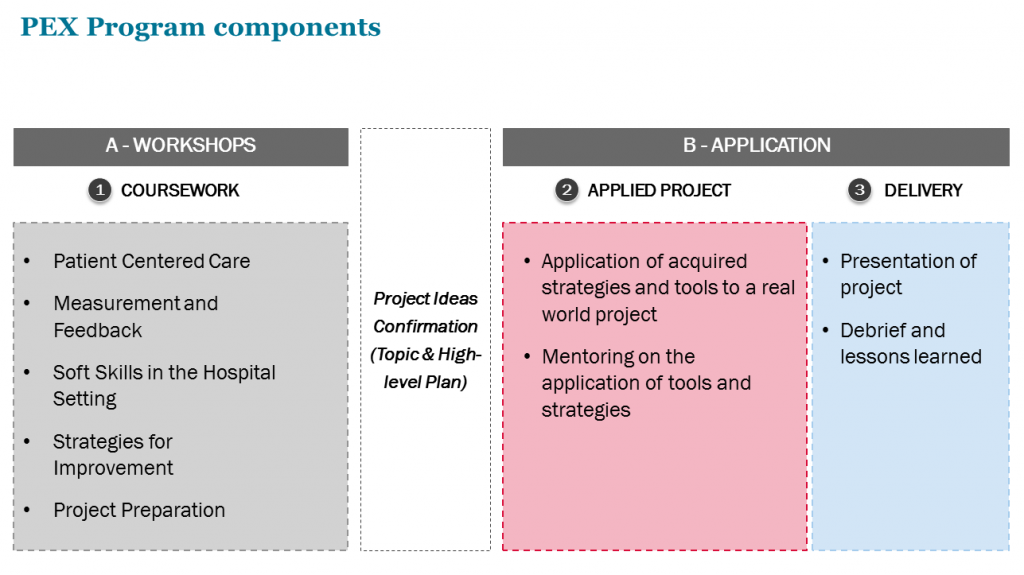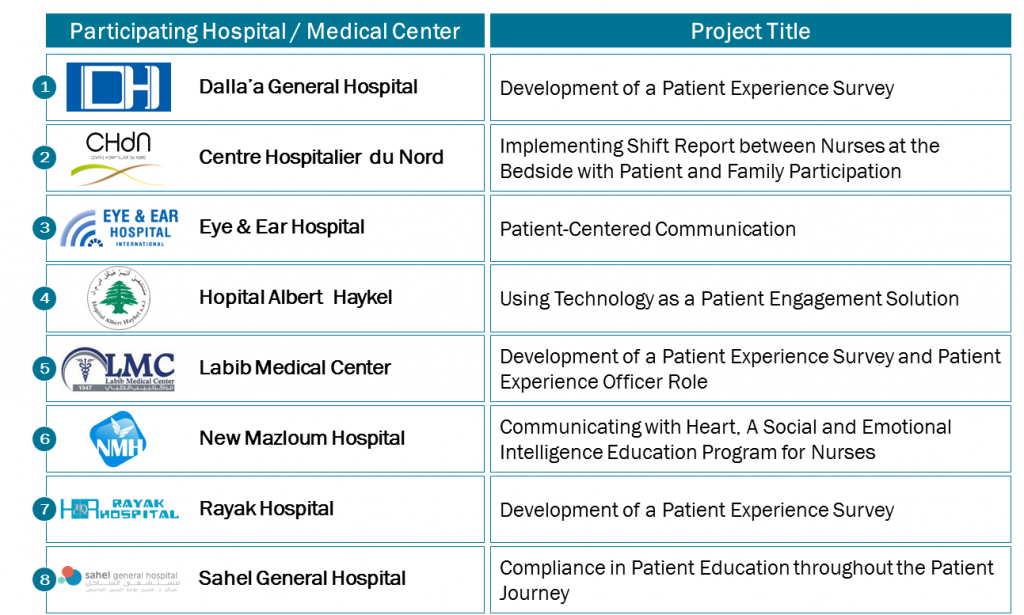

The Patient Experience (PEX) has emerged as a key priority for national healthcare systems and hospitals in particular, prompting better care, higher quality, and lower costs. The Beryl Institute defines the patient experience as “the sum of all interactions, shaped by an organization’s culture, that influence patient perceptions across the continuum of care”. Consequently, perceptions of performance and quality of healthcare are embracing the patient experience as an important indicator. The focus is on individualized care and tailoring of services to meet patient needs and engage them as partners in their care.
In Lebanon, the first round of the Patient Experience (PEX) Development Program delivered by CAPADEV came to a close at the Syndicate of Hospitals on January 18, 2018. Participants from the eight hospitals that completed the full cycle of this pioneer course that uniquely combines coursework and real world hospital projects guided by CAPADEV mentors presented the results of their work projects. Adopting a project-based learning approach, the program focused on developing essential competencies and instilling a sense of ownership in participants, with the objective of translating their newly acquired knowledge into veritable PEX initiatives in their respective hospitals. The participants, comprised of medical doctors, nurses, quality managers, and other C-level directors and middle managers, carried forward the mission of making a real patient experience difference through their projects.

Figure 1: Overview of the PEX Program structure, comprised of coursework and real world application of projects in the hospital setting
Following the coursework and a two-week project planning phase, participants were engaged for six weeks in implementing a hands-on project at their respective hospitals, incorporating the learnings acquired during the preceding coursework sessions held earlier in November. All projects centered on initiatives to improve the patient experience at the hospital. Within this broad theme, participants were at liberty to choose the initiatives they wished to focus on, whether related to process improvement, or education, or data collection, or otherwise, in accordance with the current needs at their hospitals. Throughout the projects, the CAPADEV mentors held weekly guided sessions with the participants to support in the design and implementation of the projects from both a technical (clinical) as well as managerial standpoints.
A short overview of each project is provided below:
1. Centre Hospitalier du Nord, “Implementing Shift Report between Nurses at the Bedside with Patient and Family Participation”. The project focused on pioneering bed-side handover with the aim of enhancing communication and ensuring more complete transfer of information. The new process was piloted in the Cardiac Care Unit and included the update of processes and handover templates in addition to staff education and changing perceptions and culture.
2. Dalla’a Hospital, “Development of a Patient Experience Survey”. The project focused on converting the patient satisfaction survey into a patient experience survey for in-patient care and rolling it out in the obstetric, medical and surgical services departments.
3. Eye & Ear Hospital, “Patient-Centered Communication”. The project focused on developing a communication course for staff across several departments involving nurses, physicians, and administrative staff (course participants were chosen by the hospital management). During the project, pre- and post-assessments were held, educational content was delivered in two separate sessions, and observations of communication behavior was tracked before and after the course delivery.
4. Hopital Albert Haykel, “Using Technology as a Patient Engagement Solution”. The project team worked with the hospital’s IT department to develop a dedicated digital service on the hospital’s website. The service enables enhanced access to information including patient test results and medical records and allows for online consultation with a resident doctor.
5. Labib Medical Center, “Development of a Patient Experience Survey and Patient Experience Office Role”. The project had two focal points: the development of a patient experience survey with measurable KPIs, and the creation of a new role, Patient Experience Manager, to be held by one of the participants. The Patient Experience Manager is the first such position in a hospital in Lebanon, and in line with international best practice trends (e.g. Cleveland Clinic).
6. New Mazloum Hospital, “Communicating with Heart, A Social and Emotional Intelligence Education Program for Nurses”. The project team developed and started to deliver an educational program for nurses focused on enhancing communication between staff and with patients. The project includes a pre- and post-assessment tool, the design of the educational content, delivery methods and tools to ensure sustainability.
7. Rayak Hospital, “Development of a Patient Experience Survey”. The project piloted a patient experience survey in an out-patient department and used the lessons from the pilot to adapt and trial the survey for patients staying overnight at the hospital.
8. Sahel Hospital, “Patient Education throughout the Patient Journey”. The project focused on enhancing compliance of the transfer of information and educational material to surgical patients along their journey from pre- to intra- to post-op phases. The team identified critical handover points, updated forms, and recommendations for enhancing compliance.

Table 1: Participating hospitals / medical centers and respective projects
The final presentation day on January 18 provided an opportunity to solicit feedback from the project teams on their lessons learned, the key challenges they faced throughout the projects, and their impressions of the program as a whole. In addition to producing initial results, the projects have managed to galvanize the people and the culture in each hospital around patient experience improvements. Program participants doing the projects worked hand in hand with many other colleagues to get the projects completed. Most importantly, the projects tended to be prioritized and well supported by senior management. Participants stated “it was a very nice experience from all sides, we learned a lot from mentors, participants and the CAPADEV team. We will try to apply what we did in our daily work to have a better patient experience”
The final project presentations were followed by a certificate awarding ceremony attended by the Director of the Syndicate of Hospitals, Ms. Rita Rahbany. Many participants expressed interest in convening at a later point for an update on each other’s progress and to keep benefiting from the experiences of the “Alumni” group, leading to continuous cycle of learning.
The next round of Patient Experience Development Program is set for April. This will be an opportunity for participating hospitals to send new staff in order to maintain the “learning-and-achieving” momentum and for new hospitals to participate in this improvement project-based program.
https://www.syndicateofhospitals.org.lb/Content/uploads/SyndicateMagazinePdfs/7285_38-41.pdf
